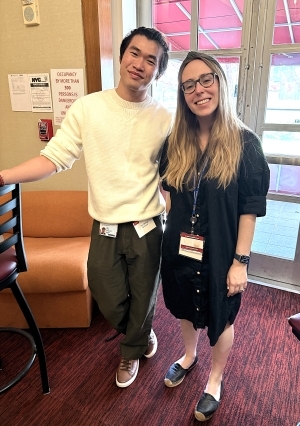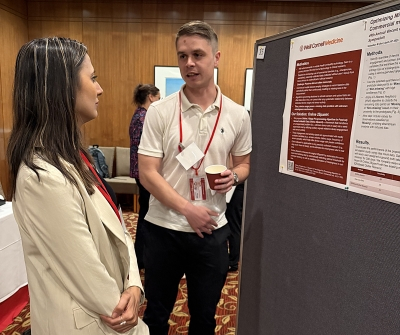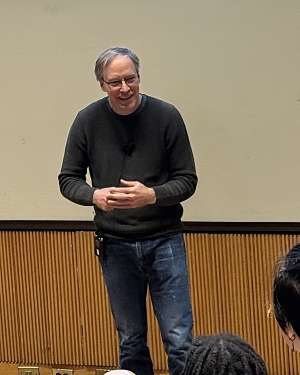
Vincent du Vigneaud Symposium co-chairs Jian Zheng and Tzippora Chwat-Edelstein
The Griffis Faculty Club buzzed with excitement as doctoral students from the Weill Cornell Graduate School of Medical Sciences presented their research, drawing peers, faculty and alumni to the 44th annual Vincent du Vigneaud Symposium on April 24. Entirely student run, the all-day symposium showcased more than 120 projects and embodied the intellectual vibrancy of the Weill Cornell community.
“Every year, the symposium gives us a chance to really come together as a school to learn about what Weill Cornell can do as a whole community,” said third-year graduate student Jian Zheng from the Xiaolan Zhao lab at Memorial Sloan Kettering Cancer Center, who co-chaired the event.
The poster presentations and talks spanned the seven graduate programs from neuroscience to pharmacology and more. “It is inspirational for the graduate school community to see the passion and dedication of our students for their research,” said Dr. Randi Silver, associate dean academic affairs of the Weill Cornell Graduate School of Medical Sciences.
Presenters from Near and Far
This year included a poster from Weill Cornell’s newest doctoral program in population health sciences, which launched last fall. Sebastian Brylka, originally from Poland with an undergraduate degree from Kenyon College in Ohio, chose to study at Weill Cornell because of the diverse subject areas the program offers. His research involves analyzing, with patient permission, passive data from cell phones to help develop better mental health interventions. Heath data, including step counts, time spent at home and time spent in conversations, can be inaccurate because smartphones turn their sensors on and off, losing track of information.
To counter this, Brylka is developing and testing an algorithm that cleans up the data, improving accuracy. The presentation earned Brylka the symposium’s first-year student poster award. “I am honored to win the prize; it’s completely unexpected,” he said. “It was a valuable experience to share my work and talk to so many new people who stopped by to learn about my poster.” The research was conducted with Dr. Samprit Banerjee, associate professor of biostatistics in population health sciences at Weill Cornell Medicine, who directs the doctoral program.

Sebastian Brylka in population health sciences won the first-year student poster award.
Beyond sharing research, the symposium provides a forum for students to formally present their work to faculty and postdoctoral judges with the top presenters earning coveted du Vigneaud Prizes, which will be awarded at the Weill Cornell Graduate School convocation next month.
Each judge is assigned four to five posters in their area of research to discuss with the presenters and evaluate. Dr. Samantha Keil, a postdoctoral associate in radiology, said she volunteered to be a judge because she likes the mentoring aspect of the symposium. “I have a neuroscience background in a clinical setting across a few disease modalities,” she said. “I think it helps the students to talk to someone with a neuroscience background when presenting about the field.”

Graduate student Julio Mejia (left) discusses his poster.
Several students traveled from Houston Methodist where they are conducting research while taking virtual Weill Cornell graduate classes. Julio Mejia said he looks forward to his annual trips to New York City for the Vincent du Vigneaud Symposium and program retreats. He presented his poster on spinal cord injuries and hopes his research will lead to new treatments in the future. “I like the balance of being at Houston Methodist, which has an emphasis on translational science, with the strong background in basic research that Weill Cornell gives us,” said Mejia, a fourth-year student in physiology, biophysics, and systems biology. He also appreciated the symposium’s low-pressure environment that has helped him build the communication skills crucial to conveying his research.
Bringing Community Together
Looking across the packed room, co-chair Tzippora Chwat-Edelstein, also from the Zhao lab, said she felt a sense of accomplishment after months of behind-the-scenes planning. “It’s wonderful having a room full of people talking and interacting about science,” she said. “It was also gratifying to see how excited people are to present and share their research.”
This year’s symposium featured a keynote address from Dr. David Bartel, a member of the Whitehead Institute, professor of biology and Howard Hughes Medical Institute Investigator at the Massachusetts Institute of Technology. “We thought Dr. Bartel would appeal to a wide audience with his impressive research on RNA regulation that spans different disciplines,” Chwat-Edelstein said. “He comes from academia but has connections to industry, which many students are interested in also.”

Keynote speaker Dr. David Bartel
Dr. Bartel studies how cells control which genes are turned on or off—specifically through tiny molecules called microRNAs. This fine-tuned control can "silence" certain genes by blocking their ability to be effectively translated into proteins. His research findings shed light on problems with RNA regulation that can lead to diseases like cancer.
The day closed with a mixer where graduate students and alumni who have gone on to work in academia and industry, such as biopharma and science publishing, networked and socialized.
“The symposium provides an opportunity for students and faculty to see the breadth of research being undertaken and the enormous promise of our students as the next generation of research leaders,” said Dr. Barbara Hempstead, dean of the Weill Cornell Graduate School of Medical Sciences.
The symposium honors Dr. Vincent du Vigneaud, Nobel laureate and former chair of the Department of Biochemistry at Weill Cornell Medicine, who was passionate about education and student research.
Oral Presentation Awards
Dana Goerzen, “Machine Learning-Enabled Liquid Biopsy Identifies Brain Tumors via Systemic Immune and Tumor Microenvironment Signature” (Principal Investigator: Dr. Daniel Heller)
Wanyi Chen, “Trastuzumab Deruxtecan (T-DXd) Resistance via Loss of HER2 Expression and Binding” (Principal Investigator: Dr. Sarat Chandarlapaty)
First-Year Poster Presentation Award
Sebastian Brylka, “Optimizing Missing Data Detection in Commercial Health Data” (Principal Investigator: Dr. Samprit Banerjee)
Second-Year and Above Poster Presentation Awards
Anna Peczak, “Exploring potential mechanisms by which the E167K variant of TM6SF2 increases MASLD predisposition in humans” (Principal Investigator: Dr. Robert Schwartz)
Guillermo Hoppe, “Molecular Analysis of Enterococcus faecalis with Reduced Susceptibility to Ampicillin Associated with a Frameshift Deletion in pbp4” (Principal Investigator: Dr. Cesar Arias)
Jaina Wollowitz, “Machine Perception-Based Prediction of Pregnancy Loss” (Principal Investigator: Dr. Daniel Heller)

